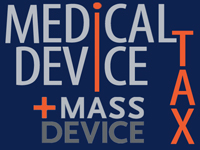
Medical device lobbying groups are remobilizing efforts to repeal a 2.3% sales tax as the industry scrambles to meet the 1st payment deadline this month.
A trio of industry advocates banded together to urge Congress to take action on the tax, which they estimate will cost medical device makers about $194 million per month.
The 1st payments are due today and should represent 2.3% of applicable sales from January 1 to January 15, according to IRS regulations released last month. The federal tax agency agreed to waive late fees for companies who miss early due dates.
"Instead of investing in new medical technologies or creating new jobs, innovators across the U.S. wrote a check to the IRS this month," Medical Device Manufacturers Assn. president Mark Leahey said in prepared remarks.
"Every dollar spent on this tax is a dollar taken away from medical innovation and job creation," lobbying group AdvaMed’s president & CEO Stephen Ubl added. "This tax is already resulting in layoffs, reduced investments in R&D and delays in significant capital improvements. We urge Congress to act swiftly and repeal this job-killing, innovation destroying, anti-competitive tax."
The tax took effect at the start of the year over the objections of the largest lobbying organizations in the medtech industry, but the fight is not over, the groups vowed.
"While the first payments of the medical device tax may have been collected, the resolve and commitment of the medical technology community is stronger than ever to put an end to this bad policy," Leahey said. "MDMA and our members remain committed to repealing the medical device tax, but it shouldn’t take more job losses and forgone therapeutic advancements to highlight just how damaging this policy is to a unique American success story."
Device makers lost valuable ground in the battle when the tax was left out of the fiscal cliff negotiations at the end of the year, but industry leaders have been optimistic about the amount of support they’ve been able to cobble together in the Upper Chamber, pointing to a recent letter supported by Democratic Senators in favor of repealing the tax.
AdvaMed’s Ubl issued a separate letter to Congress this month, asking lawmakers to reconsider a pattern of decisions that "are weakening the medical technology industry in the United States," including the medical device tax; reimbursement cuts for diagnostics, imaging and durable medical equipment; cuts to physician payments; and a competitive bidding program for diabetes test strips.
"These types of proposals may serve the short-term interests of Congress to find savings or offset temporary extensions of other policies, but they ignore the longer-term cumulative impact these policies have on patient access to appropriate treatments and cures," Ubl wrote. "At a time when the federal government is working to promote investment in the U.S. industries of the future, reduce health care costs, and improve the quality of medical care, it would be counterproductive for Congress to continue to look to the medical technology industry as a source of revenue through repeated cuts and harmful tax policy."
Ubl noted that the device tax is "at the top of the list of damaging policies."
Medical Imaging & Technology Alliance executive director Gail Rodriquez reiterated some of Ubl’s sentiments in the joint press release issued this week, warning that U.S. jobs and innovation are at risk.
"In spite of the clear economic and clinical value of medical imaging and radiation therapy technologies, Congress has implemented a job-killing device tax, leaving medical device manufacturers with little choice but to reduce their workforce and cut funding for R&D," Rodriguez said in prepared remarks.

